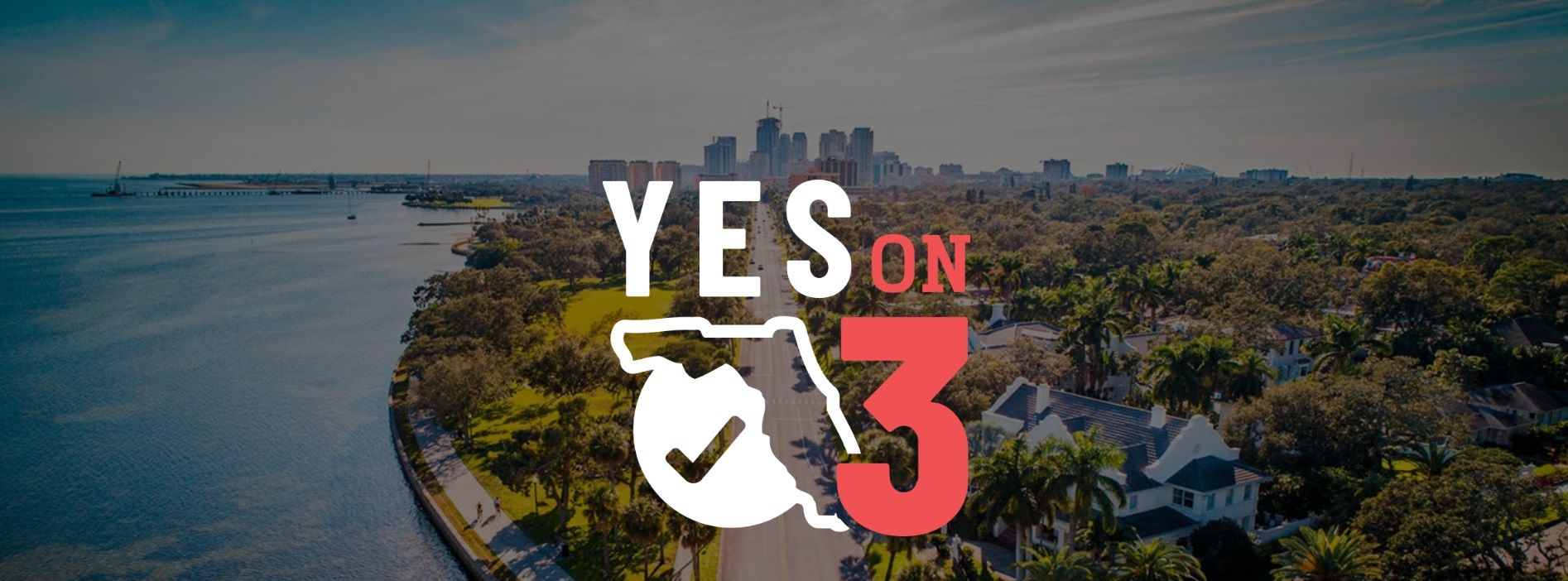Amendment 3 Did not pass. What does this mean for Florida’s Hemp Industry?
In a surprising turn of events, Amendment 3—the proposed constitutional amendment to legalize recreational cannabis in Florida—did not pass. For many, this outcome came as a disappointment.
However, for Florida’s hemp industry, it marks a huge win. The failure of Amendment 3 is not just a political defeat for those advocating for broader cannabis legalization; it’s a significant moment for the state’s hemp sector, which has long struggled under the shadow of the medical cannabis monopoly.
Amendment 3 aimed to legalize the adult-use recreational cannabis market in Florida, allowing anyone over the age of 21 to legally purchase and consume cannabis. While it garnered support from cannabis advocates, it also faced a significant amount of resistance, both from political figures and the powerful medical cannabis industry.
The amendment ultimately did not receive the necessary votes to pass, falling short of the required threshold.
For those watching the cannabis industry closely in Florida, the failure of Amendment 3 was bittersweet. While it may have been seen as a setback for cannabis legalization supporters, it created a unique opportunity for the state’s hemp industry, which has been waiting for a more level playing field.
Florida’s Medical Cannabis Monopoly:
Currently, Florida’s medical cannabis market is a tightly regulated, limited industry controlled by a few large players.
The state has created a system where a select number of licensed medical marijuana treatment centers (MMTCs) have a stranglehold on both cultivation and distribution, leading to concerns over lack of competition, high prices, and limited options for patients.
As part of the medical cannabis regulations, the state has imposed strict controls over production, distribution, and even the types of cannabis products available. This monopoly structure has, to some extent, stifled innovation and growth in other areas of the cannabis sector, particularly hemp.
Hemp, which is derived from the same plant species as marijuana but contains less than 0.3% THC, has faced significant challenges under this umbrella of strict regulations.
Despite its potential for a variety of uses—ranging from CBD products to textiles, construction materials, and even biofuels—Florida’s hemp industry has been constrained by a regulatory environment that has often seemed more aligned with protecting the medical cannabis market than nurturing hemp’s growth.
Could this be a Huge Win for Hemp in Florida?
With Amendment 3 failing to pass, Florida’s hemp industry can now look forward to more freedom and potential for growth.
The failure of recreational cannabis legalization means that the state’s lawmakers will likely turn their attention back to the hemp sector and take steps to create more balanced regulations that foster competition and innovation.
One of the key benefits of this development is the potential for the hemp industry to operate in a less restrictive environment. While medical cannabis will still dominate the market for marijuana-derived products, hemp has the chance to develop into a thriving, independent sector in Florida.
Without the overshadowing presence of medical cannabis regulations, the hemp industry now has an opportunity to push for more favorable policies. This could include relaxed licensing requirements, more access to retail markets, and the ability to scale production in a way that creates jobs, supports local economies, and delivers quality products to consumers.
Moreover, the hemp sector can now advocate for clearer and more consistent regulations that don’t have to work within the framework created for the much more heavily regulated medical cannabis market. It opens the door for hemp businesses to thrive without being hindered by overbearing rules that primarily benefit the medical cannabis industry.
What’s Next for Florida’s Medical Cannabis Industry?
Despite the win for hemp, it’s important to recognize that Florida’s medical cannabis industry will continue to play a major role in the state’s cannabis landscape. Medical cannabis is here to stay, and patients will continue to benefit from the robust infrastructure that has been built around it.
What’s next for Florida’s medical cannabis industry, however, is likely a shift toward even more regulation and oversight. With Amendment 3 off the table, lawmakers may focus on fine-tuning existing medical cannabis regulations, which could mean more adjustments to things like product availability, patient access, and licensing for MMTCs.
The medical cannabis industry may also see more competition and innovation as newer companies work to develop unique, high-quality products that meet the growing demand from patients.
Expect to see more investment in research and development of cannabis-derived medicines, as well as potential for additional therapeutic cannabis options that expand beyond the traditional flower and concentrates that dominate the market today.
Conclusion
The defeat of Amendment 3 represents a turning point for Florida’s hemp industry. After years of uncertainty and struggle under the weight of medical cannabis regulations, the hemp sector can finally look forward to a future where it is free to grow and flourish without the constant fear of being overshadowed or stifled by restrictive policies.
For years, hemp has been held back, caught in the crossfire of debates around marijuana legalization. But now, with the failure of Amendment 3, the hemp industry in Florida has been given a lifeline—a chance to develop on its own terms. Farmers, entrepreneurs, and consumers alike can breathe a collective sigh of relief, knowing that they no longer have to navigate a maze of confusing and conflicting regulations. Hemp is no longer just an afterthought or a niche market. It’s now poised to become a legitimate, dynamic sector with untapped potential for growth and innovation.
This newfound stability allows the hemp community to focus on what truly matters: healing. Whether it’s through CBD products that improve well-being, sustainable textiles that benefit the planet, or eco-friendly materials that revolutionize industries, the opportunities for hemp are limitless. The focus can now shift from survival to thriving—creating high-quality products, advancing research, and improving the lives of people across the state.
For the first time in years, Florida’s hemp industry doesn’t have to worry if it will survive the next wave of political uncertainty. It’s no longer a question of “will it make it?” but rather “how far can it go?” This is a fresh start—a chance to grow, innovate, and, most importantly, heal. And that is something to celebrate.
The Bottom Line: A Bright Future for Florida’s Hemp Industry
The defeat of Amendment 3 has opened new doors for Florida’s hemp industry. With fewer regulatory barriers and less competition from the medical cannabis sector, hemp can finally carve out its own path to success. The state now has the opportunity to support this growing industry in a way that fosters sustainability, innovation, and health.
As the regulatory landscape becomes more supportive, we can expect to see greater access to markets, more investment in hemp research, and new opportunities for Florida’s farmers and entrepreneurs. The industry is well-positioned to become a cornerstone of the state’s economy, driving job creation and offering sustainable, high-quality products that meet consumer demand.
Whether it’s through developing new hemp-based products, expanding the availability of CBD wellness solutions, or creating eco-friendly alternatives to traditional materials, the future is bright for Florida’s hemp industry. For the first time in a long while, we can look to the horizon with confidence, knowing that the future of hemp in Florida is full of promise.
The potential for growth, healing, and innovation is vast, and with this newfound stability, Florida is ready to lead the way in the hemp revolution. The journey ahead is full of opportunity, and the time for hemp to shine has finally arrived.



